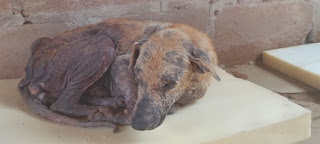Several months ago, a man saw some boys throwing large rocks at a group of puppies near the village where we live. There were four small pups. As he got closer, he realized that three of them had already been killed by the stones. He quickly put an end to the violence and rescued the remaining pup.
The man brought the pup to a woman who lives nearby and who is
known for her kindness to animals. She took in the young pup and nursed it back
to health and then eventually posted on social media that she had a young dog
available for adoption. You might’ve already guessed that the dog now lives
with us. Her name is “Binti” which means “Daughter” in Kiswahili and she has since
become a part of the Johnson Family.
In Tanzania, dogs are treated differently than in the US. Human relationships to animals can be complicated and of course they vary by culture. In a place where most people struggle to buy food, the concept of a Doggie Day Spa is beyond comprehension. Still, the purposeful killing of a group of puppies with rocks is considered cruel. When I tell Binti’s story to friends in the US, they are appalled. Kids killing puppies?! How terribly awful.
It's not hard to imagine the scenario when one considers the nature of violence though. Richard Rohr once wrote, “Pain that is not transformed, gets transmitted.” I think back to a comic I saw once. The first frame showed a boss mistreating a male employee at work. The man then goes home and mistreats his wife. She in turn mistreats her son and finally in the last frame you see the little boy mistreating his dog.
As a child who grew up in a dysfunctional household with a very angry father-figure who often took his anger out on me, I can relate to this. I hated the feeling of powerlessness and so I often looked for things that I could control or exert power over. Of course, I didn’t really know what I was doing when acting out the role of a bully. Looking back, I just remember feeling hurt, angry, and confused.
In the US, domestic violence has significantly decreased since
I was a kid. It is a big problem in Tanzania though. There are a number of
education and outreach programs that are trying to address this issue, but just
like in the US, the paradigm will take time and effort to change. As child, bullying
was an accepted reality in my elementary school. Now there are anti-bullying
campaigns and kids begin learning the value of empathy at a much younger age. But
just as pain that is not transformed gets transmitted to something else, we
sometimes turn it into something else. The core problem still exists, but we learn
to ignore it and mask it as something different. For example, I know that kids
throwing rocks at puppies would instantly draw attention back home and would
appall people. However, I also know that many Tanzanians would be equally appalled
if they walked into a US slaughterhouse.
Cattle are raised for food here too, but they are treated well. The cold automation and mass industrialization of meat production in the US is a far cry from the pastoralists who spend the majority of their day taking personal care of their most valuable economic assets. Despite the fact that the cow will end up on someone’s plate, there is a relationship that exists between the herder and the animals that connotes care and respect. If you have watched footage from a US slaughter house, you will see that this is not case.
So what is the difference between the person who hurts a dog and the person who buys processed lunch meat at the super market? What is the difference between the company that treats their mining employees like slaves and the person that buys a ring whose diamond comes from the same company?
A
degree of separation doesn’t stop the violence, it just hides it. And while the
truth is sometimes painful and is almost always inconvenient (it’s easier to
enjoy our Starbucks coffee than it is to ponder where the plastic cup will end
up), we must learn to see beyond what is right in front of us. A degree of
separation might disguise our responsibility for taking care of animals and of each
other, but it doesn’t absolve us of it.





